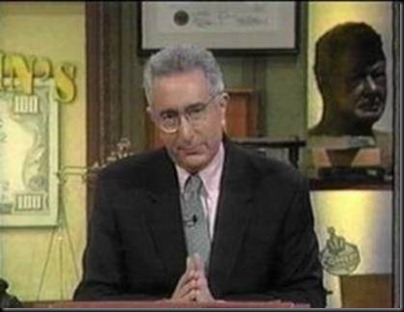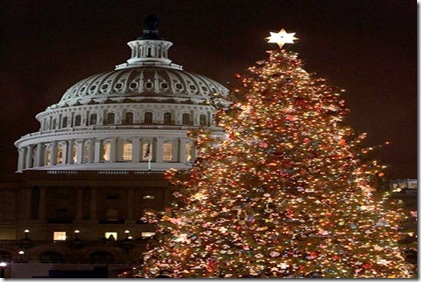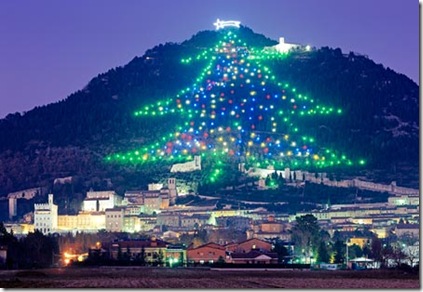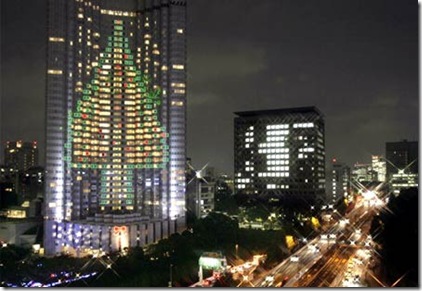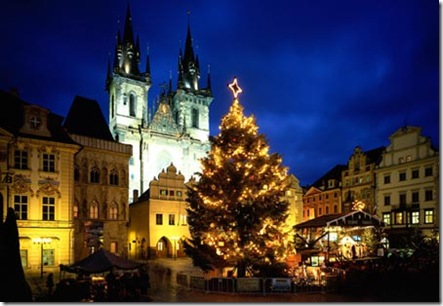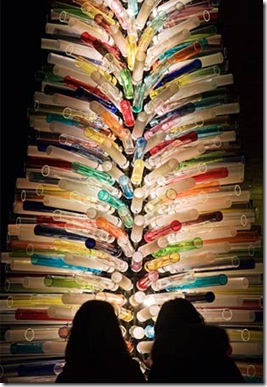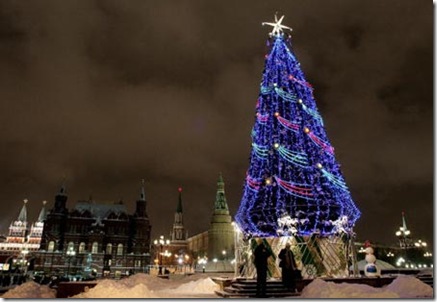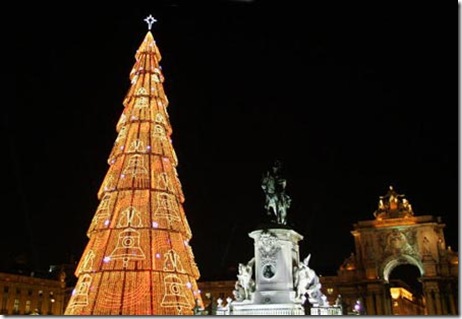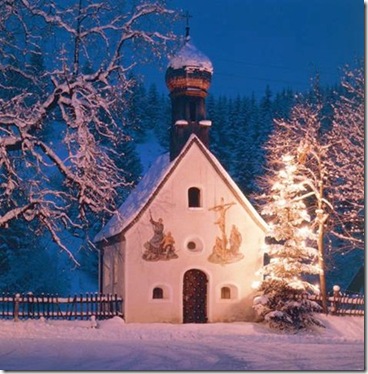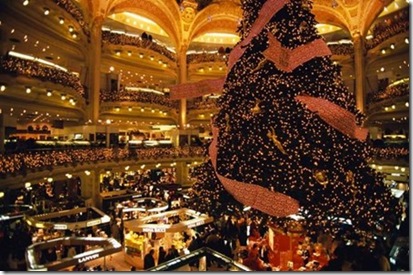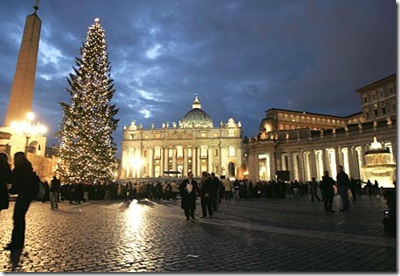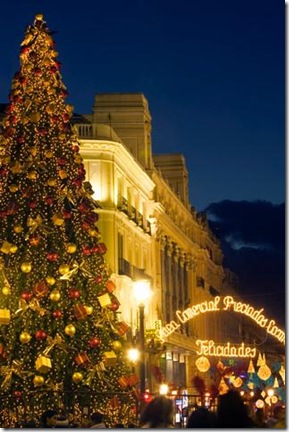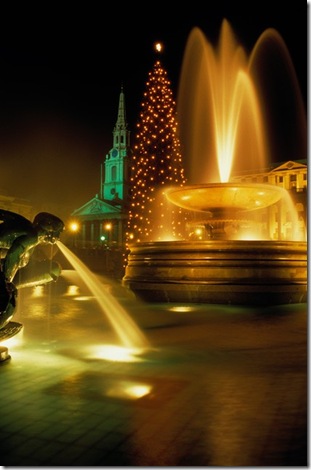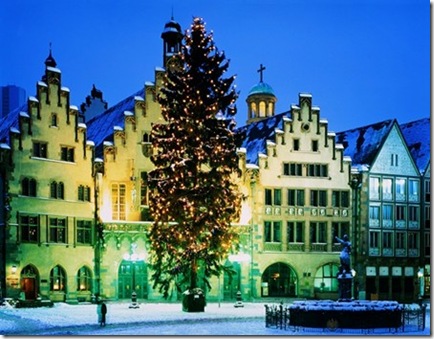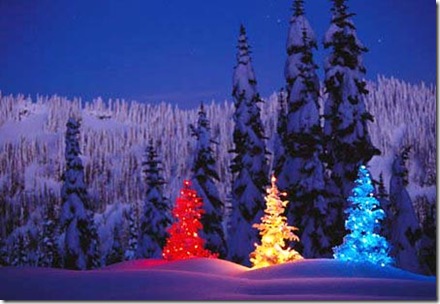Christmas: An American Holiday to Love and Preserve…
The War on Christmas verses the Spirit of Christmas Series by Marion Algier - AskMarion – 4
Once upon a time not all that long ago – in fact, anyone over 50 will easily remember it – the word “Christmas” was everywhere during the month of December. Everywhere you looked – in stores, in town squares, in cities, in offices, and, of course, in private homes — there were Christmas trees, Christmas decorations, Christmas cards, Christmas gifts, Christmas parties, and Christmas vacations. Even Jews got into the act… Hanukkah Bushes, Christmas lights in blue and white and an embracement of all the festivities. Just ask Ben Stein.
Christmas was arguably the most beloved of American holidays. Independence Day, Memorial Day, and Thanksgiving were important too; but Christmas was something more. It gave rise to a whole “Christmas season” during which people got into the “Christmas spirit.” The first words of a popular song, recorded by Johnny Mathis as a platinum hit, summed it up perfectly: “It’s beginning to look a lot like Christmas / Everywhere you go…”
Then something strange began to happen. The very thing that made the “season” special started to disappear from the public arena. Stores no longer held “Christmas sales.” Businesses, and soon after, individuals, ceased to hold “Christmas parties.” And on and on. “Christmas” became a dirty word, and was replaced by “holiday.” The War on Christmas had begun.
We’ve grown so accustomed to the change that we’ve lost sight of just how significant it is. “Christmas” is loaded with meaning and rich in spirit. It imparts rich feelings unlike anything else. “Holiday,” by contrast, is a bland word that can signify anything from Independence Day to Labor Day to “Sweetest Day.” At most, it means a day that you might get off from work if you’re lucky. And nothing else. Saying “holiday” and meaning Christmas is like saying “a long dead politician” (Kindle) and meaning Abraham Lincoln (Kindle). Technically, it’s not wrong. But the whole significance is lost.
Of course, this didn’t happen by accident. Ask most people how it happened, and they’ll just shrug and say, “political correctness.” And in fact, “PC” is a cruel master, uncaring about what it destroys, and swift to punish those who violate it. So most choose to bow and submit.
But not here. We are part of the The Battle for Christmas. We hope to reclaim the richness and beauty of Christmas. But it’s more. Christmas is a treasure and and part of our heritage that we all should be actively working to preserve our traditional American culture in any and all forms. Because that culture is worth keeping. It’s part of what holds us together and makes us American… including those of us who are not Christians.
So let’s fight back in the war on Christmas. And to all who feel the same we do… happy holidays and Merry Christmas!: Celebrating America’s Greatest Holiday (Kindle).
“The Celebration of Christmas in America is not Just a Christian Holiday, but a Celebration of our National Past and Our Collective Wishes and Psyche as a Nation!”
In his mawkish 1942 hit "White Christmas," Bing Crosby yearned for a holiday "just like the one I used to know." The extraordinary popularity of Crosby’s nostalgic longing (the all-time top-selling single until it was eclipsed by "Candle in the Wind 1997," Elton John’s mawkish tribute to Princess Diana) suggests the holiday’s tremendous power to revive memories–perhaps only imaginary, idealized memories–of  childhood and Christmases past. According to Karal Ann Marling, "Christmas is the universal memory" for contemporary Americans (whether they’re Christian or not), an event in which "virtually everybody has played a part." By telling the story of Americans’ celebration of Christmas, she promises to uncover a surprisingly neglected piece of not only our national past, but our collective wishes and psyche.
childhood and Christmases past. According to Karal Ann Marling, "Christmas is the universal memory" for contemporary Americans (whether they’re Christian or not), an event in which "virtually everybody has played a part." By telling the story of Americans’ celebration of Christmas, she promises to uncover a surprisingly neglected piece of not only our national past, but our collective wishes and psyche.
Marling, a prolific and inventive cultural historian at the University of Minnesota who has written books on topics ranging from George Washington (George Washington Slept Here: Colonial Revivals and American Culture, 1876-1986) and Norman Rockwell to Disneyland (Designing Disney’s Theme Parks: The Architecture of Reassurance) and Graceland (Graceland: Going Home with Elvis) and As Seen on TV: The Visual Culture of Everyday Life in the 1950s, now turns her attention to the history of America’s most lavishly celebrated holiday. Marling has a keen eye for offbeat topics, arresting detail and original interpretations, and refuses "to plug the contents of the national Christmas stocking into the socket of orthodox historical discourse" (certainly that sounds unadvisable). She insists instead that her goal is to unwrap the hidden meaning of quotidian, but telling objects and practices to reveal the holiday’s deeper significance.
Myriad "scraps of Christmas detritus"–and Christmas generates loads of detritus–supply Marling with ample material: Shortly after Halloween, America’s shopping malls and stores are festooned with red and green and stocked from floor to ceiling with Christmas gifts. In the days after Christmas, discarded trees, still dangling tinsel, lie amid trash bags stuffed with discarded wrapping paper and packaging on curbs across the nation. Somewhere in between the shopping bags and the trash bags, millions of Americans attend their annual office party, endure children’s pageants, spend billions of dollars buying presents, cook traditional feasts, and gather with family and friends to exchange gifts and celebrate the nation’s most extravagant holiday. Wrapping paper, lights, ornaments, store window displays, trees, cards, Santas and cookies fill the thematic chapters of Merry Christmas! The history of Christmas, as Marling observes promisingly, is in the details.
Americans commonly assume that Christmas endured for centuries as a solemn religious holiday, before being corrupted by consumer capitalism. As early as the 1870s, critics of Christmas were engaging in "breast-beating over soulless American materialism." In 1949, opponents of the holiday’s excess launched a crusade to "restore" its "original" character. Billboards, posters and bumper stickers urging Americans to "Put Christ Back into Christmas" were a common sight during the holiday season throughout the 1950s. Like many tales of decline, this Christmas story proves a fable. In colonial America, Christmas was either not celebrated at all (it was actually illegal to celebrate the holiday in many Puritan communities), or an occasion for boisterous, drunken revelry.
In fact nearly all of Americans’ Christmas rituals and icons are 19th-century inventions, created to venerate home and family, not the birth of Jesus. Christmas trees, artfully bedecked with ornaments, became the focal point of Americans’ Christmas celebrations in the 1850s. Santa Claus became an icon in the 1860s and 1870s, springing from the pen of cartoonist Thomas Nast. Gift-giving became commonplace in the 1870s and 1880s, as more Americans adopted the practice of purchasing inexpensive, factory-made trinkets–"gewgaws" and "gimcracks"–and wrapping the presents to produce surprise. By century’s end, Christmas had become a legal holiday in every state, and the year’s most eagerly anticipated holiday for millions. In the 1920s, advertisers transformed Santa into a jovial salesman, whose girth and cheerfulness embodied consumer abundance: According to Marling, St. Nick, not that gangly, gaunt Uncle Sam, best personifies America.
As Marling observes, Americans’ celebration of Christmas grew along with material abundance and consumer culture, and the department store window, not the Nativity scene, has always furnished the holiday’s central icon. "Christmas," she writes, "is all about stores and shopping." Conversely, stores and shopping rely heavily on Christmas. Last year, Americans spent a record $184 billion during the Christmas shopping season (officially, the weeks between Thanksgiving and Christmas), and many retailers depend on Christmas sales for one quarter of their annual revenue.
But Marling is most interesting when she discusses the holiday’s paradoxes, which mingle materialism and generosity. Retailers and advertisers deliberately have exploited holidays to encourage consumption, but they have by no means stripped these "holy days" of their deeper meaning altogether. Marling notes that our most materialistic holiday is also ironically "the primary occasion for considering the harsh realities of the world, and those who have no trees and puddings."
As a result, charitable giving to the poor has accompanied the holiday since the 19th century. Charles Dickens’ A Christmas Carol (Kindle), which has ranked among Americans’ most beloved Christmas stories since its publication in 1843, offers a largely secular plea on behalf of the less fortunate. Funding charity dinners for the poor at Christmas time became an annual ritual of penance for the well-to-do in American cities in the late 19th century. Wealthy benefactors congratulated themselves for bestowing feasts and presents on their less fortunate neighbors, but could not have failed to recognize the troubling gulf, let alone the connection, between their abundance and others’ privation. Christmas’ mixture of materialism and charity remains paradoxical to our own day: Each December, as it has since 1912, the New York Times juxtaposes full-page advertisements for luxury gifts with small-font reminders urging readers to "Remember the Neediest."
If Christmas provides a "universal memory" for Americans, it is in large part because advertising and celebrating the holiday are so ubiquitous; even Unabomber Ted Kaczynski, railing against the evils on modern technology in his Montana cabin, took time to write Christmas cards to his neighbors each December. Christmas is so omnipresent that many nonbelievers celebrate the holiday, and even members of other faiths cannot altogether ignore it, try as they might. Stephen Nissenbaum, for example, prefaces his own history of the holiday, The Battle for Christmas (Kindle), with a touching reminiscence of his boyhood memories of Christmas as an outsider growing up in an Orthodox Jewish household.
But surely different groups of Americans have distinct recollections of the holiday. Protestants and Catholics, rich and poor, white, Asian, black and Latino–all have celebrated on December 25, but they have not celebrated alike. Marling’s attempt to delineate the diversity of Christmas traditions, a grab-bag chapter on "Somebody Else’s Christmas," lumps together Christmas in warm climes, white Northerners’ sentimental but patronizing fascination with black Southerners’ humble Christmas celebrations in the 19th century, immigrants’ Christmas traditions, even Kwanzaa. A more systematic discussion would fulfill Marling’s ambition of recasting our understanding of the holiday. And yet, though Merry Christmas! does not completely transform our view of the Christmas we "used to know," it does detail the little gestures and objects that supply the stuff of which Christmases are made.
Chris Rasmussen teaches American history at the University of Nevada, Las Vegas. During this holiday season, he urges Americans of all faiths to "Put the Christ Back into Christmas."It is part of American heritage and tradition! (Originally Posted in December 2009)
By Karal Ann Marling – Author of Merry Christmas! : Celebrating America’s Greatest Holiday (Kindle)
On Glenn Beck’s 2010 Post-Thanksgiving Review Program Rabbi Daniel Lapin (who founded the American Alliance of Christians and Jews) said: Although I am Jewish and do not celebrate Christmas I respect the traditions and the holiday and like the holiday for two good reasons: It helps the economy and it makes people better… (95% of the money spent at Christmastime is for others… rather than for ourselves).
Lapin has spoken against the secularization of Christmas, saying that "We see obsequious regard for faiths like Judaism and even Islam, while Christianity is treated with contempt". He is opposed to replacing the "Merry Christmas" greeting with "Happy Holidays", saying instead "Let us all go out of our way to wish our many wonderful Christian friends a very merry Christmas… Nationwide, Christmas Nativity Scenes are banned from city halls and shopping malls but Chanukah/Hannukah menorahs are permitted. One of the latest incidents: School Administrators Reportedly Instruct Teachers to Remove Christmas Cards From Hallways.
Merry Christmas!: Celebrating America’s Greatest Holiday (Kindle)
A great book on Losing Our Religion(Kindle) by atheist S. E. Cupp, who says she is he perfect person for this book because she has no dog in the hunt, takes on the all too often avoided question and discussion of religion in America…
The Battle for Christmas (Kindle)
Related:
Where Does the War on Christmas Come From? A Worthwhile Read – WoC 2013
The War on Christmas verses the Spirit of Christmas Series 2013 at AskMarion – WoC 2013
ANOTHER FAILED IDEA: Woman gets laughed at after bringing up Obamacare at Thanksgiving…
Disney scores big with biblical values
Advent – The Season of Anticipation and Hope – WoC 2013
Obama Thanksgiving and Christmas Disgrace
Keeping Pets Safe for the Holidays: The “Not So Safe” or No-No Pet Food List
Sarah Palin on Politics and Religion • 11/10/13 With Susan Page
The Cross – Billy Graham’s Message To America
Best Holiday Movie Classics – A Merry Christmas From Hollywood
Two great new books for the holidays: ‘Good Tidings and Great Joy: Protecting the Heart of Christmas’ (Kindle) and The Romney Family Table: Sharing Home-Cooked Recipes & Favorite Traditions (Kindle)



